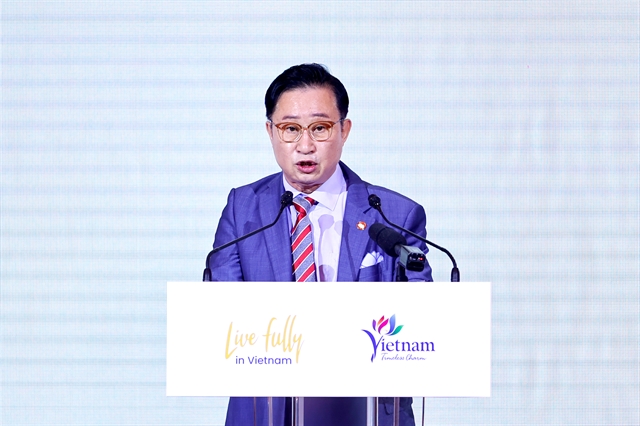Việt Nam ready for smart tourism era
Culture - Ngày đăng : 09:55, 05/07/2024
 |
| Lee Chang Kun, Việt Nam's Tourism Ambassador to South Korea at the event. — Photo baochinhphu.vn |
SEOUL — Việt Nam is believed to be well-equipped with the necessary social infrastructure and legal framework to usher in an era of smart tourism.
The assertion was made by Lý Xương Căn (Lee Chang Kun), Việt Nam's Tourism Ambassador to South Korea and a 31st-generation descendant of King Lý Thái Tổ, at the Việt Nam-South Korea Tourism Promotion and Cultural Cooperation Forum held earlier this month in Seoul, South Korea.
The event was jointly organised by the Ministries of Culture, Sports and Tourism of both nations, in collaboration with the Vietnamese Embassy in South Korea and relevant agencies, to mark the official visit of Prime Minister Phạm Minh Chính to South Korea.
Căn said that a report on Smart Tourism Ecosystem Development Readiness in Southeast Asia, released by the Asian Development Bank (ADB) in April this year, ranked Việt Nam as the second most prepared nation in Southeast Asia for smart tourism.
He outlined the proposal of an Electronic Tourism Payment, an international electronic tourism payment initiative using QR code payment methods, which could include VAT refunds for tourists, at the event.
South Korean tourists would be able to use their domestic financial institution’s QR payment function on their mobile phones to make payments at VietQR-affiliated shops in Việt Nam without any special procedures.
“With just a smartphone, there will be no need for credit cards or cash,” he said.
The project, prepared over two years, is currently being advanced by the Việt Nam National Administration of Tourism's Promotion Office in South Korea, the State Bank of Việt Nam, the National Payment Corporation of Việt Nam (NAPAS), South Korea's QR payment platform GLN International and the Joint Stock Commercial Bank for Investment and Development of Việt Nam (BIDV).
It is under review by the State Bank of Việt Nam, with expectations that South Korean tourists could be using the service within the year.
The main benefit of this project was the reduction of international card payment fees and currency exchange costs for tourists, enhancing shopping and travel convenience using just a smartphone.
For the nation, it boosts tax management efficiency by promoting tourism consumption and ensuring transparent sales transactions at shops.
The next initiative was the VAT refund project for foreign tourists.
South Korean and other international tourists were subject to VAT when spending in Việt Nam. Thus, the project aimed to offer VAT refunds for shopping and services in Việt Nam, under certain conditions.
Countries like the United States, Europe, South Korea and Japan already recognised tourism as an export industry and had vigorously promoted activities in the sector.
Currently, Việt Nam had about 2,000 VAT refund shops and the entire process from VAT refund registration to receiving the refund was manual.
To enhance the quality of VAT refund services, the Việt Nam National Administration of Tourism's Promotion Office in South Korea, the Việt Nam General Department of Customs, and South Korea’s tax refund specialist KICC were considering the project to implement an optimised tax refund system in Việt Nam.
The digital tourism service was essential for Việt Nam to advance as a developed tourism nation.
If implemented, Việt Nam would have a national tourism tax refund system ahead of the United States, Europe and Japan.
The projects would significantly impact and promote the development of Việt Nam's smart tourism ecosystem and infrastructure.
A historical film
Also at the event, Căn proposed the idea of producing a film titled 'Eight Centuries of Aspiration - Returning to the Roots' which narrates the historical relationship between Việt Nam and South Korea.
It revolves around Prince Lý Long Tường of the Lý Dynasty in Việt Nam, who sought refuge in Goryeo, South Korea, 800 years ago.
The prince played a crucial role in the battle against the Mongol invasion of Goryeo and was honoured as General Hwasan by the Goryeo King, adopting the Hwasan Lee surname.
The longstanding historical ties between Việt Nam and South Korea continue to this day.
The prince's lifelong wish to return to his homeland was passed down to his descendants and now, after eight centuries, his descendants had found their way back to their ancestral land, Việt Nam.
On June 13, at a seminar on the K-Việt Nam Valley project in Bonghwa County, South Korea, South Korean Minister of Culture, Sports and Tourism Yoo In-chon said the historical narrative was fascinating and could be adapted into a feature film, TV series or animated film.
He said that the South Korean Ministry of Culture, Sports and Tourism would actively support the production, adding that the film would symbolise the eternal cooperative relationship between Việt Nam and South Korea, showcasing cultural heritage and inspiring the younger Vietnamese generation to take pride in their nation's history and cherish their homeland.
Through the film, Căn also hoped to ignite a sense of awareness and pride in the Vietnamese roots among over five million Vietnamese people and their descendants living worldwide. — VNS
